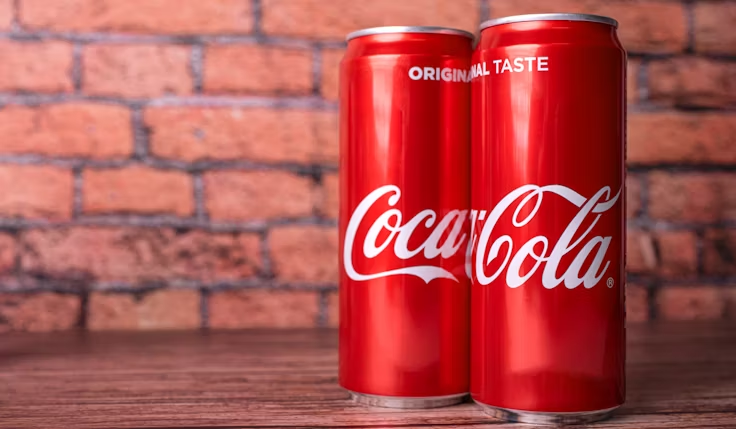In Atlanta, Georgia, a group of friends met at a diner. Their laughter and talk filled the air. They noticed the Coca-Cola logo on the menu, starting a lively chat about the brand’s lasting impact.
“Coca-Cola is more than a soda to me,” said Sarah, sipping her drink. “It reminds me of my childhood and family gatherings.” Her friends agreed, sharing their own special moments with Coca-Cola.
The talk turned to Coca-Cola’s global influence and its role in popular culture. “It’s incredible how Coca-Cola has grown beyond being just a drink,” said Michael, a marketing expert. “It’s now a cultural icon, loved everywhere.”

As they dug into Coca-Cola’s history and business tactics, it was clear it’s more than a drink. This article will look at why Coca-Cola is a big part of global culture. We’ll see how its brand recognition, product range, and commitment to social and environmental causes make it special.
Key Takeaways
- Coca-Cola is a global cultural icon, transcending its origins as a soft drink
- The brand’s marketing strategies have been instrumental in its widespread recognition and popularity
- Coca-Cola has diversified its product portfolio beyond carbonated beverages
- The company has a strong focus on corporate social responsibility and environmental initiatives
- Coca-Cola’s rich history and ability to connect with consumers have fostered unwavering brand loyalty
Coca-Cola: A Global Icon
Coca-Cola has grown beyond just a soft drink. It has become a cultural icon known worldwide. Its logo and branding are instantly recognizable, making it a top brand in the world.
Brand Recognition and Cultural Significance
The Coca-Cola brand is known by people everywhere. Its red and white colors, along with its unique bottle and logo, bring back memories. This global brand recognition has made Coca-Cola more than just a drink. It’s a cultural icon that connects people across the globe.
“Coca-Cola is more than just a soft drink – it’s a global symbol that has become woven into the fabric of society.”
Coca-Cola connects with people from all walks of life. It changes its marketing to fit local cultures. This has helped it become a cultural icon. Campaigns like “Coca-Cola Happiness” and “Share a Coke” show its ability to touch hearts.
Coca-Cola’s global brand recognition and cultural icon status have made it more than a drink. It’s a symbol of shared moments, nostalgia, and global unity.
The Power of Marketing Strategies
Coca-Cola’s marketing has made it a global icon. It has used amazing ads and partnerships to shape its brand. This has helped it grow beyond just a soft drink.
The “Share a Coke” campaign is a big hit. It made bottles and cans personal, creating strong bonds with people. This shows how Coca-Cola uses personal touches and nostalgia to connect with its audience.
Coca-Cola is always trying new things in its marketing. It uses new tech and trends to keep its ads exciting. This keeps it in touch with what people like.
- Coca-Cola’s Super Bowl ads are a big deal. They tell stories that touch people’s hearts.
- Working with famous people helps Coca-Cola reach more people. It makes the brand feel closer to everyone.
- Using social media and virtual reality keeps Coca-Cola fresh. It shows it’s always up to date.
Coca-Cola’s marketing is all over the place, but it works. It has built a strong brand that goes beyond just a drink. Its smart use of marketing strategies has helped it stay on top.
“Coca-Cola’s marketing campaigns have a way of capturing the spirit of the times and connecting with people on an emotional level.”
Product Diversification: Beyond Carbonated Beverages
Coca-Cola is known for its famous soda, but it has grown a lot. It now offers many different products. This product diversification makes Coca-Cola more than just a soda company. It has become a big name in many areas.
Exploring Coca-Cola’s Diverse Product Portfolio
Coca-Cola now makes juices, waters, coffees, and teas. It has Minute Maid juices and Dasani waters. These moves help the company reach more people and meet their changing tastes.
Buying Costa Coffee in 2019 was a big step. It let Coca-Cola get into the coffee market. This move helps the company grow and reach more customers.
| Product Category | Coca-Cola Brands |
|---|---|
| Carbonated Soft Drinks | Coca-Cola, Sprite, Fanta |
| Juices and Fruit Drinks | Minute Maid, Simply, Odwalla |
| Water and Sports Drinks | Dasani, Powerade |
| Coffee and Tea | Costa Coffee, Fuze Tea |
Coca-Cola keeps growing by offering new products. It uses its strong brand and wide reach to find new chances. This way, Coca-Cola stays fresh and meets the needs of its customers all over the world.
Corporate Social Responsibility: Giving Back to Communities
Coca-Cola’s success is rooted in its commitment to corporate social responsibility. It sees its role as more than just making and selling drinks. It views itself as a global citizen, working to make a positive impact on the communities it touches.
The company tackles many issues through its corporate social responsibility efforts. It works on environmental, social, and community projects. This includes supporting sustainable water programs, empowering youth, and improving education.
- Sustainable Water Stewardship: Coca-Cola has made big steps in water conservation. It replenishes the water it uses and helps ensure communities have clean drinking water.
- Community Development: The company teams up with local groups to enhance life for people and families. It focuses on health, education, and social welfare.
- Environmental Protection: Coca-Cola also works on reducing its carbon footprint. It promotes recycling and tries to cut down on waste in its operations.
These corporate social responsibility actions have helped communities worldwide. They’ve also boosted Coca-Cola’s reputation and solidified its role as a responsible business. By linking its goals with the greater good, Coca-Cola shows the impact of corporate social responsibility in creating real change.

“We believe that being a responsible corporate citizen is not just the right thing to do, but it’s also good for our business in the long run. When communities thrive, so do we.”
Environmental Initiatives: Sustainability in Action
Coca-Cola puts a big focus on taking care of the environment. The company works hard to cut down its carbon footprint and support green practices. This shows Coca-Cola’s dedication to being a good corporate citizen and protecting the planet for the future.
Coca-Cola’s Efforts to Reduce Its Carbon Footprint
Coca-Cola has a detailed plan for being more sustainable. It aims to lower greenhouse gas emissions, boost recycling, and use more renewable energy. These goals show Coca-Cola’s commitment to the environment and a greener future.
- Coca-Cola wants to have zero carbon emissions by 2050.
- The company is investing in solar and wind power for its buildings.
- Coca-Cola is also working to use less plastic and more recycled materials.
| Initiative | Target | Progress |
|---|---|---|
| Renewable Energy | 100% renewable electricity by 2030 | Currently at 70% renewable electricity |
| Plastic Packaging | 50% recycled content in plastic packaging by 2030 | Currently at 25% recycled content |
| Water Stewardship | Replenish 100% of water used in final beverages by 2030 | Currently at 87% water replenishment |
Coca-Cola’s efforts show its strong commitment to the environment. By leading the way, the company inspires others to be more sustainable. This helps make a better future for everyone.
“At Coca-Cola, we believe that environmental sustainability is not just a responsibility, but an opportunity to create a better world for all.”
The Rich History of Coca-Cola
Coca-Cola’s journey as a global icon is filled with historical significance. It started in the late 19th century as a medicinal tonic. Over time, it grew into a cultural phenomenon, linked to the world’s economic and social history.
In 1886, John Pemberton, a pharmacist in Atlanta, Georgia, created the original Coca-Cola formula. It was first marketed as a cure-all elixir. It promised to relieve headaches, boost energy, and treat morphine addiction.
The unique mix of carbonated water, sugar, and coca leaf extract quickly became popular. It became a beloved drink.
As the 20th century went on, Coca-Cola spread worldwide. Its smart marketing, like the iconic contour bottle and “Coca-Cola” script logo, made it a cultural icon. It was tied to World War II and the Cold War, showing its historical significance.
Today, Coca-Cola is everywhere, with products in almost every corner of the globe. Its lasting popularity shows the company’s ability to change and stay true to its values. The historical significance of Coca-Cola still fascinates scholars and casual fans alike, as they explore its incredible story.
Fostering Consumer Loyalty: The Secret Sauce
Coca-Cola has become a global giant by building strong consumer loyalty. It has created emotional bonds with its customers. This is thanks to its skill in brand storytelling.
The company has turned from just a soft drink to a key part of people’s lives. This is through its powerful marketing and storytelling.
Building Emotional Connections with Customers
Coca-Cola focuses on the emotional and cultural value of its brand. It doesn’t just sell a drink. It tells stories that touch people’s hearts.
The “Share a Coke” campaign is a great example. It made the brand more personal by using names on bottles and cans. This made people feel closer to Coca-Cola.
| Loyalty Program | Rewards | Engagement |
|---|---|---|
| Coca-Cola Rewards | Free drinks, merchandise, and experiences | Encourages repeat purchases and brand advocacy |
| MyCokeRewards | Points for purchases, redeemable for prizes | Enhances customer engagement and brand loyalty |
| Coca-Cola Insiders Club | Exclusive access to products, events, and content | Fosters a sense of community and brand affinity |
Coca-Cola also has loyalty programs that reward customers. These programs give out free drinks, merchandise, and special experiences. This encourages people to buy more and become loyal fans.
“Coca-Cola has mastered the art of building emotional connections with its customers, transcending the boundaries of a mere soft drink and becoming an integral part of people’s lives.”
reasons why Coca Cola is not just a soft drink
Coca-Cola is more than a drink. It’s a global icon that has grown beyond its roots. The brand has a rich cultural value and innovative business tactics. It has become a powerful force that keeps evolving and winning hearts around the world.
A Cultural Phenomenon
Coca-Cola’s influence goes beyond drinks. Its red and white logo is known everywhere. It’s seen in ads, movies, and TV, becoming a part of our shared memories. It stands for joy, celebration, and shared moments.
A Diversified Business Portfolio
Coca-Cola is famous for its soda, but it offers much more. Today, it includes juices, water, teas, and coffee. This variety keeps it relevant as tastes change.
Commitment to Sustainability
Coca-Cola cares about the planet and people. It works to reduce waste and protect water. This shows it’s a company that values the communities it serves.
In short, Coca-Cola is more than a drink. It’s a cultural icon, a global leader, and a symbol of innovation and care. Looking into these areas shows that Coca-Cola is much more than just a soft drink.

“Coca-Cola is not just a soft drink. It’s a global phenomenon that has transcended its original purpose and become an integral part of our cultural fabric.”
Brand Storytelling: Weaving Narratives into Campaigns
Coca-Cola’s success comes from its ability to tell engaging stories. These stories connect with people on an emotional level. Through ads and marketing, the company shares stories that touch hearts around the world. This makes Coca-Cola more than just a drink.
Coca-Cola’s Ability to Connect with Audiences
The Coca-Cola brand is known for happiness, togetherness, and lasting memories. It taps into these feelings to create a strong bond with its customers. From “Share a Coke” to holiday ads, Coca-Cola’s brand storytelling crosses cultural lines. It speaks to people on a personal level.
Coca-Cola’s skill in brand storytelling keeps it relevant for many years. It tells stories that celebrate life’s moments. This makes Coca-Cola a symbol of joy, celebration, and simple pleasures.
FAQ
Why is Coca-Cola more than just a soft drink?
Coca-Cola has grown beyond being just a drink. It’s a global icon with a wide range of products and strong marketing. It also cares about the environment and helps communities. Its rich history and ability to tell stories have made it more than a drink.
How has Coca-Cola’s brand recognition and cultural significance evolved over time?
Coca-Cola’s logo is known everywhere, making it a global icon. It connects with people all over, thanks to its wide recognition and emotional appeal. This has made it more than just a drink.
What role have Coca-Cola’s marketing strategies played in shaping its identity?
Coca-Cola’s ads and partnerships have made it more than a drink. Its marketing has turned it into a cultural phenomenon. This has helped it stand out.
How has Coca-Cola diversified its product offerings beyond carbonated soft drinks?
Coca-Cola is known for its soft drinks, but it offers more. It has juices, waters, coffee, and tea. This variety has made it more than just a soft drink brand.
What are some of Coca-Cola’s corporate social responsibility initiatives?
Coca-Cola cares about the environment and communities. It invests in projects that help people and the planet. This has made it a respected company.
How has Coca-Cola addressed environmental concerns through its sustainability initiatives?
Coca-Cola works to reduce its impact on the environment. It aims to make its operations more sustainable. This shows its commitment to the planet, beyond just making drinks.
What is the historical significance of the Coca-Cola brand?
Coca-Cola started in the late 19th century. It has a rich history, from a medicinal tonic to a global brand. Its story is part of world history and culture.
How has Coca-Cola fostered consumer loyalty and emotional connections with its brand?
Coca-Cola has built strong loyalty and emotional bonds with its customers. It uses stories and marketing to connect with people. This has made it more than a drink.
What are the key reasons why Coca-Cola is more than just a soft drink?
Coca-Cola is more than a drink because of its cultural impact, global reach, and commitment to innovation and social responsibility. Its diverse aspects show it’s more than just a soft drink.
How has Coca-Cola’s brand storytelling and ability to connect with audiences contributed to its success?
Coca-Cola’s success comes from its storytelling and emotional connections. Its ads and marketing create compelling stories that touch people worldwide. This has made it more than just a soft drink.



